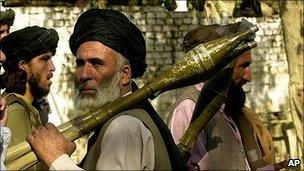Afghanistan campaign needs political follow-up, say MPs
- Published

Talks with the Taliban should be held because the current tactics being used in Afghanistan are not succeeding in achieving a stable solution, say MPs.
A Commons foreign affairs committee report said the US must step up efforts to hold talks with the Taliban if a political resolution was to be reached.
Conservative MP Richard Ottaway, the committee's chairman, said: "Every day you're fighting you're not talking."
Ministers said insurgents who renounced violence were "being spoken to".
The report also suggests the British government's stated purpose for having troops in Afghanistan - to protect UK national security - may have been achieved "some time ago" because al-Qaeda's strength in the country appeared limited.
But there were also a "number of risks" in the UK's aim of withdrawing combat troops by 2015, it added.
Mr Ottaway told BBC Radio 4's Today programme: "There is no doubt there have been great tactical successes in the south but at the end of the day we can't win militarily.
"If you can get Pakistan, the US, Afghanistan and the Taliban around the table that is a very important role for the (British) government."
Watch: Committee chairman Richard Ottaway: "Every day we are fighting is a day less for negotiation"
But he admitted it was difficult to begin talks with the insurgents, adding: "There is no address for the Taliban."
David Cameron has promised to be an "all-weather friend" to Afghanistan.
The prime minister said on Tuesday the country had a "strong" relationship with the UK and that change would involve a "political process".
The government has said it wants British combat troops to leave Afghanistan by 2015, and last month Defence Secretary Liam Fox suggested some of the 10,000 personnel could come home this year if "conditions on the ground" were suitable.
'Crucial distinction'
Earlier Mr Ottaway said: "There is a danger that, without political leadership, the current military campaign is in danger of inadvertently derailing efforts to secure a political solution to what is essentially a political problem.
"The US should not delay its significant involvement in talks with the Taliban leadership because, without US support in this respect, there can be no longer-term peace in Afghanistan."
He added: "We question the fundamental assumption that success in Afghanistan can be 'bought' through a strategy of 'clear, hold and build'.
"The distinction between al-Qaeda and the Taliban, which is so often overlooked or confused in current debates, is crucial to generating appropriate policy responses in Afghanistan.
"We question the government's logic that a full-scale counter insurgency campaign aimed at the Taliban is necessary to prevent al-Qaeda returning or that it could ever succeed."
The "security rationale" behind the 2015 deadline for withdrawing combat troops was also not clear, and the policy had "a number of potential risks", according to the MPs' report.
Mr Ottaway said: "Her Majesty's Armed Forces have our full support in tackling the challenges before them and their efforts are rightly described in so many instances as heroic.
"It is our hope that this report will be received in the constructively critical manner in which it is intended, and regarded as a contribution to the wider debate which is taking place on how to improve a situation to which there are no easy solutions."
'Renounced violence'
Foreign Office minister Alistair Burt said he agreed with the committee that political reconciliation was "absolutely essential" for Afghanistan's long-term stability.
"There are people with whom the Afghan government can engage on a political process," he told BBC Radio 5 live.
"This is an Afghan-led political process. President Karzai has set out the parameters on it. Those he speaks to have to have renounced violence and be prepared to work with the government in Afghanistan. The process is going on."
On the 2015 withdrawal, Mr Burt said the decision had been reached following extensive consideration by ministers and military chiefs and was "well understood" by all involved.
Labour said commanders on the ground in Afghanistan were clear that military progress alone would not bring stability to the country.
"The strength and sacrifice of our forces must be matched by a surge in political and diplomatic efforts," said shadow foreign secretary Douglas Alexander.
"After the lack of grip from ministers making crisis decisions outside Cobra [the government's emergency response committee] last week, the bipartisan committee's finding that the National Security Council wasn't convened to decide the issue of troop withdrawal will raise wider questions about how this government gets a grip on key foreign policy decisions."
- Published14 February 2011
- Published29 January 2011
- Published29 January 2011